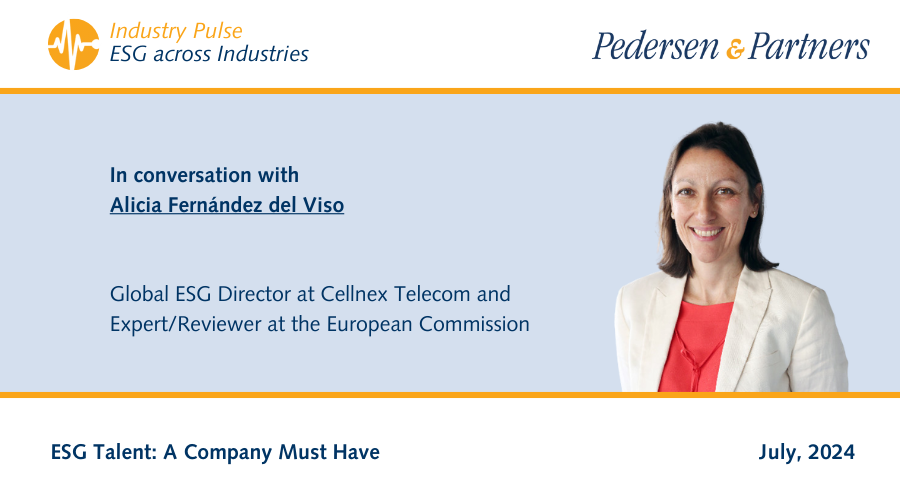In conversation with Alicia Fernández del Viso, Global ESG Director at Cellnex Telecom: ESG Talent - A Company Must Have
By Elisa Martinez de Miguel, Principal at Pedersen & Partners.
As part of our ongoing "Industry Pulse" series, recently we hosted Alicia Fernández del Viso, Global ESG Director at Cellnex Telecom.
Elisa MdeMiguel: Alicia has a degree in computer science engineering and a master’s degree in leadership and social innovation. She has worked at Indra, an international technology and IT company, for 20 years, and her last position was sustainability manager. She recently moved to Cellnex Telecom as the global ESG director. Additionally, Alicia has been serving the European Commission as an expert, reviewer, and reporter for the past 15 years. We couldn't find anyone better on this topic. Thanks, Alicia, for joining us.
Alicia Fernandez: Thank you, Elisa. First, I don't know if you've seen the news last week. Time Magazine, with the help of Statista, selected the 500 most sustainable companies worldwide out of 5,000. This ranking considers both environmental and social aspects. Why is Time Magazine interested in sustainability now? Let's look at the list. It includes companies from Europe, the States, Japan, Australia, and various sectors like retail, transportation, and telecommunications. Companies globally want to be labelled as sustainable. Why? Is this just a label or a real strategy? Companies are now striving to be sustainable because it's not easy. It’s costly, especially for global companies and SMEs with limited resources.
One key reason is risk management. Companies are doing business in a fast-changing world. The World Economic Forum’s Global Risk Report highlights that environmental risks are now more prominent. For instance, the top risks in 2024 include extreme weather and critical changes to ecosystems. Companies must address these risks to survive.
The second reason is the complex ESG regulatory landscape. Regulations are evolving rapidly worldwide. Companies operating globally must understand and comply with these regulations. These regulations are not optional. For example, to sell products in the UK or Australia, you need human rights due diligence to comply with the Modern Slavery Act. ESG regulation is moving fast, and companies must adapt continuously.
In Europe, the Green Deal is a significant driver. The European Commission aims to transform the EU into a clean, resource-efficient economy in line with the Paris Agreement. The goal is to be climate-neutral by 2050, with mid-term targets of reducing emissions by 55% by 2030 and 90% by 2040. The EU is increasing incentives for green investments and introducing regulations to ensure European competitiveness while pushing for global sustainability standards.
The third reason is stakeholder pressure. Shareholders, investors, consumers, new generations, and society demand sustainability. Investors believe sustainable companies have higher long-term success chances. Consumers prefer sustainable brands, and new talents want to work for companies with a social impact. NGOs and activists are also pushing for sustainability.
In this challenging context, companies face several sustainability challenges. Climate change is a significant one. Companies need to reduce carbon emissions to limit global warming to 1.5 degrees Celsius. This requires changing business models. Another challenge is the circular economy, where companies must reduce, reuse, and recycle materials.
Examples include Tesla, which makes appealing electric cars, and IKEA, the biggest consumer of wood globally, adopting a forest-positive agenda. H&M’s Conscious line commits to using 100% recycled or sustainably sourced materials by 2030.
Sustainability must be integrated across all corporate units. This includes the board, which should have ESG expertise, and various departments like legal, procurement, HR, finance, audit, operations, and IT. ESG talent is essential for developing and executing sustainability strategies.
To conclude, sustainability is not just about compliance but also about innovation and resilience. It’s about embedding sustainability in business operations and strategy. As Larry Fink said, companies need to deliver financial performance and make a positive contribution to society.
Elisa MdeMiguel: Thank you very much for this interesting presentation, Alicia. Any questions from the audience?
Jaap den Hartog: Yes, please. Thank you, Alicia. Can you share your main achievement last year and your focus for next year?
Alicia Fernandez: Sure. In my previous company, our greatest achievement was integrating the sustainability plan into the company’s strategic plan. For next year, my challenge at Cellnex Telecom is to localize our global sustainability plan across the 12 European countries we operate.
Sune Christiansen: Thank you, Alicia. How do you see companies overcoming the lack of ESG-experienced board members?
Alicia Fernandez: It depends on the industry. For sectors like energy, it’s easier. For IT or others, boards are focusing on training and development. Some have sustainability commissions to acquire necessary skills through external consultants.
I believe it’s important for companies to see sustainability not just as a cost but as a strategic advantage. Savings from reduced energy consumption and efficient operations often align with environmental benefits.
Elisa MdeMiguel: We appreciate your contribution, Alicia.

